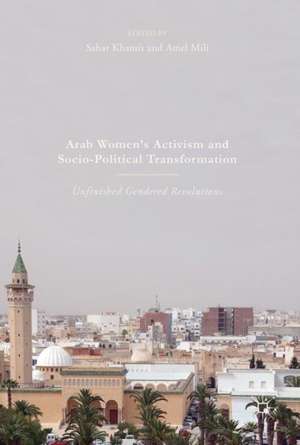Arab Women's Activism and Socio-Political Transformation: Unfinished Gendered Revolutions
Editat de Sahar Khamis, Amel Milien Limba Engleză Hardback – 4 dec 2017
| Toate formatele și edițiile | Preț | Express |
|---|---|---|
| Paperback (1) | 412.76 lei 38-44 zile | |
| Springer International Publishing – 30 aug 2018 | 412.76 lei 38-44 zile | |
| Hardback (1) | 647.59 lei 43-57 zile | |
| Springer International Publishing – 4 dec 2017 | 647.59 lei 43-57 zile |
Preț: 647.59 lei
Preț vechi: 761.87 lei
-15% Nou
Puncte Express: 971
Preț estimativ în valută:
123.92€ • 129.71$ • 103.14£
123.92€ • 129.71$ • 103.14£
Carte tipărită la comandă
Livrare economică 31 martie-14 aprilie
Preluare comenzi: 021 569.72.76
Specificații
ISBN-13: 9783319607344
ISBN-10: 3319607340
Pagini: 252
Ilustrații: XXVII, 258 p. 6 illus. in color.
Dimensiuni: 148 x 210 mm
Greutate: 0.62 kg
Ediția:1st ed. 2018
Editura: Springer International Publishing
Colecția Palgrave Macmillan
Locul publicării:Cham, Switzerland
ISBN-10: 3319607340
Pagini: 252
Ilustrații: XXVII, 258 p. 6 illus. in color.
Dimensiuni: 148 x 210 mm
Greutate: 0.62 kg
Ediția:1st ed. 2018
Editura: Springer International Publishing
Colecția Palgrave Macmillan
Locul publicării:Cham, Switzerland
Cuprins
Introduction by Sahar Khamis and Amel Mili.- Part I: Unfinished Political Revolutions.- Chapter 1 Citizenship and Gender Equality in the Cradle of the Arab Spring by Amel Mili.- Chapter 2 Women as Symbols of a Movement: The Remaining Battles for Women Activists in Bahrain by Nada Al Wadi and Sahar Khamis.- Chapter 3 Linking the Cedar Revolution and the Arab Spring by Rita Stephan.- Chapter 4 Women's Space after the Arab Spring: Can We Generalize? By Deborah Harrold.- Part II: Unfinished Social Revolutions.- Chapter 5 Voicing Dissonance: Tunisian Women’s Narratives of Dissent under Ben ‘Ali by Gretchen Head.- Chapter 6 Women and Religion in the Arab Spring by Asma Nouria.- Chapter 7 Arab Women and Post-Revolution Resistance: Egyptian Women’s War Against Sexual Harassment by Nahed el Tantawi and Amel Gaber.- Chapter 8 Stealth Revolution: Saudi Women’s Education, Labor and the Arab Spring by Nami Tsujigami.- Chapter 9 Gender Activism in the Age of Social Media by Sana Jelassi.- Part III: Unfinished Legal Revolutions.- Chapter 10 Egyptian Women’s Constitutional Rights, 2012 and 2014 by Ellen McLarney.- Chapter 11 From Lalla el-Batoul to Oum Hamza: Moroccan Women’s Ongoing Fight for Equality and Dignity by Brahim El Guabli.- Chapter 12 Women, Their Rights and Constitutionality in Egypt: Equal Rights for Equal Citizenship? Lubna Azzam.
Notă biografică
Sahar Khamis is Associate Professor in the Department of Communication at the University of Maryland, USA. She is an expert on Arab and Muslim media, and the former Head of the Mass Communication and Information Science Department in Qatar University. She is the co-author of two books: Islam Dot Com: Contemporary Islamic Discourses in Cyberspace (with M. el-Nawawy, 2009) and Egyptian Revolution 2.0: Political Blogging, Civic Engagement and Citizen Journalism (with M. el-Nawawy, 2013).
Amel Mili is the Director of the Arabic Language and Culture Program at the Lauder Institute, University of Pennsylvania, USA. She holds a JD in private law and an MS in public administration from the University of Tunis, Tunisia, as well as a PhD in global affairs from Rutgers University in Newark, NJ, USA.
Amel Mili is the Director of the Arabic Language and Culture Program at the Lauder Institute, University of Pennsylvania, USA. She holds a JD in private law and an MS in public administration from the University of Tunis, Tunisia, as well as a PhD in global affairs from Rutgers University in Newark, NJ, USA.
Textul de pe ultima copertă
This book illustrates how Arab women have been engaging in three ongoing, parallel struggles, before, during, and after the Arab Spring, on three levels, namely: the political struggle to pave the road for democracy, freedom, and reform; the social struggle to achieve gender equality and fight all forms of injustice and discrimination against women; and the legal struggle to chart new laws which can safeguard both the political and the social gains. The contributors argue that while the political upheavals were oftentimes more prevalent and visible, they should not overshadow the parallel social and legal revolutions which are equally important, due to their long-term impacts on the region. The chapters shed light on the intersections, overlaps and divergences between these simultaneous, continuous gendered struggles and unpacks their complexities and multiple implications, locally, regionally, and internationally, across different countries and through different phases.
Caracteristici
Makes a significant contribution to the literature on gender studies in the aftermath of the Arab Spring Sheds light on the long-term impacts of the social revolution that evolved following the political upheaval Addresses important and cross-cutting gender issues that also relate to states beyond those involved in the Arab Spring
